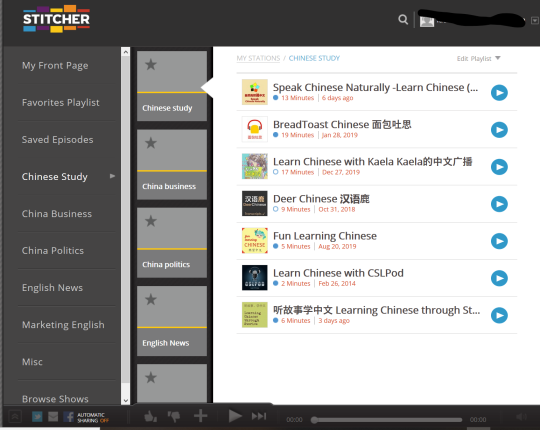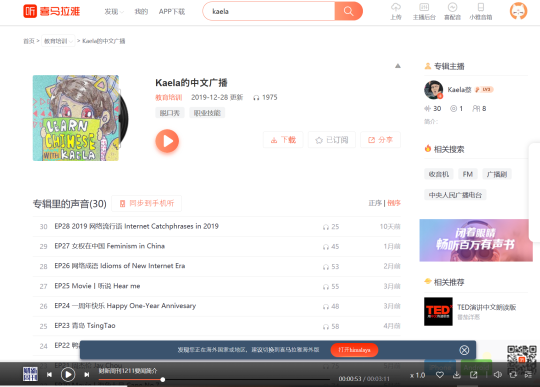#study in china


How I watch YouTube slower for language learning
My plan for improving Chinese this year is more by setting myself daily/weekly habits with my yearly goal in mind, instead of simply having a goal, I am going to attempt to dedicate a certain amount of time to each activity each day for a shrot period, which will accululate over the year instead of going hard and slow at points in the year.
1. Improve active vocabulary and comprehension
- 30m translating EN>CN articles I find online (should I share my notion link with you guys?)
- Reading books in Chinese (slowly) (would you like to see my to read list?)
2. Improve vocabulary
- Anki 10m per day (3x per week, building a habit to 7x week)
3. Improve speaking
- hanging with the roomie (who doesn’t speak English, bonus :)
- Listening to Chinesepods in the morning
4. Improve listening
- Listening to Chinesepods or YT 自媒体新闻 in the morning whilst doing make up (the first thing I do when i work up is urn this on, then my getting ready schedule takes about 30m, I squeeze in a good half hour of study right there… I highly reccomend this as first thing your brain is soo concentrated and easy to absorb info)
Non-language related learning goals
- read books (listening to non-fiction audiobooks whilst walking ANYWHERE)
- study Chinese history (by listening to audiobooks whilst walking)
- spend 1 hr in the morning on any learning project non language related (currently wanting to work on learning marketing/economics)
- podcast news/politics listening (at the gym)
In all honestly this is not many, right?
To update you guys on me, I am currently doing an internship here in China, as well as some on the side tutoring and writing my paper. Hence my study time is non existent except for the above. It’s still possible to squeee in study
WHAT ARE YOUR STUDY GOALS AND HABITS YOU WANT TO FORM THIS YEAR?
As a beginner it takes a bit of time to become accustomed to be able to hear the difference in tones, yet alone pronounce them very correctly. By the time you get to intermediate you probably can hear the difference in tones but you may still have trouble pronouncing every single word correctly.However you most likely have a number of words that you have heard so often that you do pronounce correctly. For example 中国 zhong1 guo2, I bet most intermediates pronounce this is the correct tone as it is a word occurring so often that our brains automatically imitate pronunciations. However, when we encounter a new word we may have difficulty getting the tone just right, and then you need to remember it too.
I have two bits of advice that may help with this, that I myself am using to improve my tones over time:
As soon as you learn a new word, repeat at least 10 times in the correct tone.
As I said when speaking Chinese, you are speaking at a speed that you don’t have time to remember which tone the word is, you say it how you remember it. So when you learn a new word you want to try to cement the correct ‘rhythm’ (or tone) of the word in your head. If you remember the incorrect one it may be difficult to undo this. (i remember I pronounced 文化 as wen2 hua2 for the longest time and it was difficult to change this to wen2 hua4 in my head when i discovered i had been saying it all wrong!)
Memorise a few 'tone pairs’ to remember the 'rhythm’ when you learn a new word.
Hacking Chinese ( https://www.hackingchinese.com/focusing-on-tone-pairs-to-improve-your-mandarin-pronunciation/ ) has a great article on tone pairs and it’s merits. Recently when i learn a new word I recall the 'model’ word that I have for that particular tone pair, say it a few times to remember the 'rhythm’ of the word, the n say the new word I want to learn in that same rhythm, therefore it will help saying the word in the correct tone.
For example, lets say I learnt the new word 生活 sheng1 huo2, this has the same tone pair as 中国, therefore when i learn 生活 i can easily recall how 中国 is pronounced and imitate the same rythym when i said 生活. I created a table for myself with the tone pairs and so each time I encounter, for example any word that is first tone-second tone (such as 中国), then i can recall the rythym easily in my head.

This table has a list of words that I subconsciously pronounce with the correct tones as a result of hearing them so many times, there are however too many words that i don’t pronounce in the correct tone, hence i use this method to help :P
(ignore my terrible handwriting!)
Please try this out and let me know if you try this out and how it works for you??
Hi all. Lately with the virus here in China I have been stuck inside studying. I am also been watching a few new shows in my spare time lately. Here are some of my favourite for intermediate-lower advanced listeners.
Firstly, where can you watch shows?
There are an abundance of places to watch shows, especially within China but you can often find shows on Youtube or on various C/K/J-drama sites outside (though if you can it’s best to watch with only Chinese subtitles).
Tip: If you can’t understand everything, watch once with English subs, and re-watch again with Chinese subs only!
Anyway, on to my list, I have split these between TV series and reality shows:
TV Series
1. 都挺好

This is a story about family life and the burden children may feel of their parents, it reflects modern day Chinese social issues. I really enjoyed this drama
2. 亲爱的,热爱的
I have just started watching this one. It is a love story and the main character became really popular in China last year!

3. 欢乐颂
This is sometimes called the Sex and the City of China, its about working women in the city of Shanghai!

Variety/reality
1. 爱情保卫战
This is one of my favourites! It’s a talk show where two people go on to solve their romantic issues and four ‘experts’ give them advice. Its spoken in very natural Chinese and is very interesting to see people arguing about “He was looking at another girl” or “he has changed since we first met” haha!

2. 非诚勿扰
This is the ‘Take me out’ of China, kinda… It’s essentially the same format without the crude jokes, tho. Sometimes they have foreigners on the show looking for love too.

3. 外国人在中国
This show is good for intermediates as there are foreigners speaking, the level is easier to understand in general and discusses basic things such as daily life. It also can give you a glimpse into people’s lives who are here studying too!
What are you favourite shows? Share them with us below!
When studying a language, I truly think if you want to improve your everyday listening and speaking, watching youtubers/content creators is invaluable.
BTW, you can also find me on HelloTalk (@a_lucie_58910) or instagram (@luc_9999)
Why use Youtubers to study Chinese?
1. They are not creating content specifically for learners of the language, hence they will use the most natural, native language (including chengyus etc.)
2. They chengyus they use will be ones that people use in real life (as opposed to a study resource that attempts to teach you chengyus, its not necessarily a bad thing, you should learn chengyus, but how do you know if they are ones that are commonly used spoken? If you here somebody using it in natural speech you will inevitably know it is one used in every speech. Therefore, you should make note of learning such chengyus. This also applies for grammar patterns and phrases as well. Basically, you wont sound like you learned from a textbook if you learn from native speakers in natural settings
3. The content is interesting. I love lifestyle bloggers, from telling you about a life story to helping their listeners by giving the advice, there is a lot of lengthy content to help you with your listening.
Below are 3 of my favourite Up主 because;
1. A lot of the content is in a simple, natural, chatting to the camera sort of format (just like a friend would chat with you)
2. They use chengyus in a natural way
3. They stories are interesting and relatable (i.e. I am a woman in my mid-20s to 30s as these content creators are. So the content is of interest to me. I am sorry I am unable to share content that is male-oriented. There should be an abundance on Bilibili/YT for you to find if lifestyle isn’t your interest.
1. MsLindaY
I have followed Linda since about 2016 actually, at the time I didn’t understand her videos, even after repeatedly watching them. I would download the audios onto my phone and listen on repeat. It definitely helped and now I can watch the videos, understanding the majority of content. She uses chengyus in a natural way and I have learnt many from her channel. I am eternally grateful for her content actually and have kept meaning to send her an email to thank her for these years of helping me in my Chinese learning journey!
She has a Linda讲故事 series and they are all about 40+ minutes long, GREAT LISTENING MATERIAL! as well us chatty GRWM videos etc. and she has videos that present American culture to her viewers (she lived in the US from her late teens if I do believe).
2. Tracey Chang 翠西
Tracey was a TV host on various Chinese news channels and is bilingual (she grew up in US but is from Beijing). She scatters English in her videos (but not in the annoying way that I see some uploaders… I don’t know why, it grates on me hahaha, but anyway :P)
Her videos are also about chatty GRWMs, videos talking about a certain topic (such as her employment history or what its like to work on Wall Street, or her and her husband’s LDR story). She has just given birth so recently has many videos related to pregnancy and being a mum also!
For me Tracey is very inspiring because she not only creates interesting content, she is bilingual and she is very interested in current affairs and business, she epitomises the ‘working woman’ it shows through her videos.
3. 维多 Vittos
Vittos is a blogger that posts her content mainly on bilibili, she has many long videos that talk about topics related to being a better person, self-care from within and loving yourself etc. to be totally honest, I’m not sure its the sort of content I’d watch in English, but in Chinese its great as, again, its natural language and not too difficult, just like a friend chatting with you. Videos are often up to 20 to 30 minutes long.
The below video is her recounting her study abroad experience in Italy (she speaks Italian!)
(click on the link to go to bilibli below)

https://www.bilibili.com/video/av77109513?t=2120
What are some of your favourite creators? I’d love to know for even more inspiration. Please share so we can learn and improve together :)
Podcasts are simply the best way to squeeze in study time into busy schedules. Doing any sport, doing groceries, walking to/from school and work, extra time can be squeezed in (I always think back to the analogy with the stones, pebbles, sand and water in a cup, remember that post by Hacking Chinese?).
Below is some Intermediate to advanced appropriate listening material. If you have any suggestions don’t hesitate to contact me!
By the way, I am thinking of creating an Instagram account, is that anything you are interested in? Let me know!!
Podcast software/Apps:
Stitcher, Spotify and Ximalaya all have mobile apps and desktop versions for easy syncing.



Podcast Shows:
Ximalaya Podcasts:
- 青春逗[this show is presented by two 海归 (Chinese returnees, i.e. two Chinese who have lived abroad and come back to China), therefore they sometimes mix English words within the podcast. It is a contempary topic discussion podcast, spoken in natural language between the two presenters and sometimes a third guest] https://www.ximalaya.com/shishang/18796952/
- Linda讲故事 [naturally spoken language, one person retelling a story, natural and unscripted] https://www.ximalaya.com/qinggan/29392148/
- 健康生活100问 [has a question about nutrition and it answers the question in 3-5 minute short episodes, for example ‘is MSG really bad for health?’, 'which is healthier, cow milk or soy milk?’] https://www.ximalaya.com/jiankang/18734760/
- 故事FM [each episode has a different person come to tell their story about some kind of topic, such as being abused, quitting a 'top school’, and other stories that tell lives of very ordinary people but presents a picture of lives of ordinary chinese people with a story to tell. It’s also spoken in natural, unscripted language with a host] https://www.ximalaya.com/toutiao/7878702/
- 失眠小姐[Short 3-5 minute 'life advice’ to soft background music] https://www.ximalaya.com/qinggan/292190/
- 唐诗三百首 [Learn the 300 Tang Poems] https://www.ximalaya.com/ertong/16479532/
- Kaela的中文广播 Learn Chinese with Kaela [a naturally spoken podcast presented by Kaela, transcripts for the show found at https://gaerdan.wordpress.com/ https://www.ximalaya.com/jiaoyu/16634873/
Stitcher Podcasts:
Simply search the below podcasts in your podcast app

Misc Podcast Websites:
These podcasts you can access through the podcast website (the ones with *s are ones I have used and are very good, its worth spending time on the website, you can download the MP3s to your phone)
o https://www.slow-chinese.com/podcast/*
o http://justlearnchinese.com/mini-novels/
o https://mandarinbean.com/category/advanced/
o http://justlearnchinese.com/category/chinese-short-stories/
Do you have anymore? Please share in the comments!
I have talked in a previous post about listening to an audio several times to improve listening skills. Another important aspect is slowing down the speed if it is difficult material. You can also speed audios up once you have learnt the new vocab and listened several times (i find this especially good for podcasts aimed at language learners [for example Slow Chinese/慢速中文] as they tend to be slower)
YouTube has a great function for if you want to watch some youtube video creators/TV shows + films but can’t quite listen at full speed.

There are several apps out there that can reduce/increase the speed of audio on your mobile. I currently use Audiopo

